Assertiveness is the skill of self-confidence
The ability to independently regulate one’s behaviour and be responsible for it, regardless of the assessments and influence of other people.
Assertive people communicate their wants and needs clearly and clearly set personal boundaries.
They do not lash out at others if those around them do not comply with their demands. Such people respect other people’s needs and know how to defend their point of view.
Doctor of Psychology, emotional intelligence expert Victoria Shimanskaya believes that assertiveness manifests itself in every moment when we need to make a personal choice, agree or disagree with colleagues, take a certain position or not take any.
Assertive people communicate their wants and needs clearly and clearly set personal boundaries.
They do not lash out at others if those around them do not comply with their demands. Such people respect other people’s needs and know how to defend their point of view.
Doctor of Psychology, emotional intelligence expert Victoria Shimanskaya believes that assertiveness manifests itself in every moment when we need to make a personal choice, agree or disagree with colleagues, take a certain position or not take any.
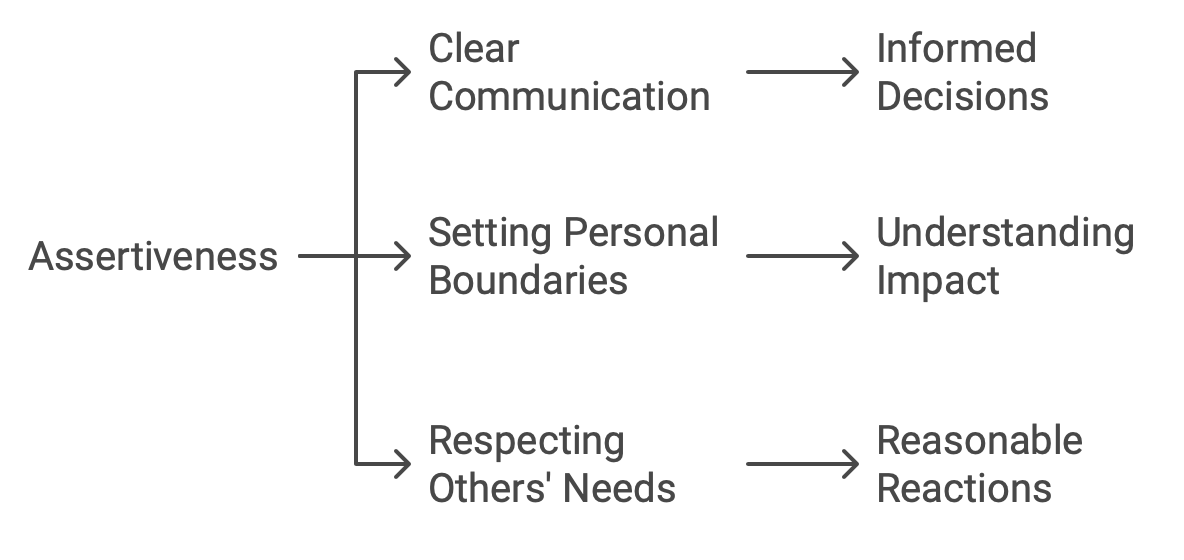
Assertive behavior means that you:
Many people do not speak out about their needs, hush up problems and avoid clarifying the relationship, or turn into aggression because they do not know how to talk about them correctly. Assertiveness is a balance between passive and aggressive communication style. In the note - People's emotions spread, influencing others, we open up details on this topic.
- always clearly aware of what you want and what you feel;
- make a decision, abstracting from your emotions, looking for support in arguments, not feelings;
- you can calculate what kind of reaction your behavior will cause in others, try to take care of the feelings of others;
- react not in the way that will be easier or as others expect, but in the way that seems most reasonable and meaningful to you.
Many people do not speak out about their needs, hush up problems and avoid clarifying the relationship, or turn into aggression because they do not know how to talk about them correctly. Assertiveness is a balance between passive and aggressive communication style. In the note - People's emotions spread, influencing others, we open up details on this topic.
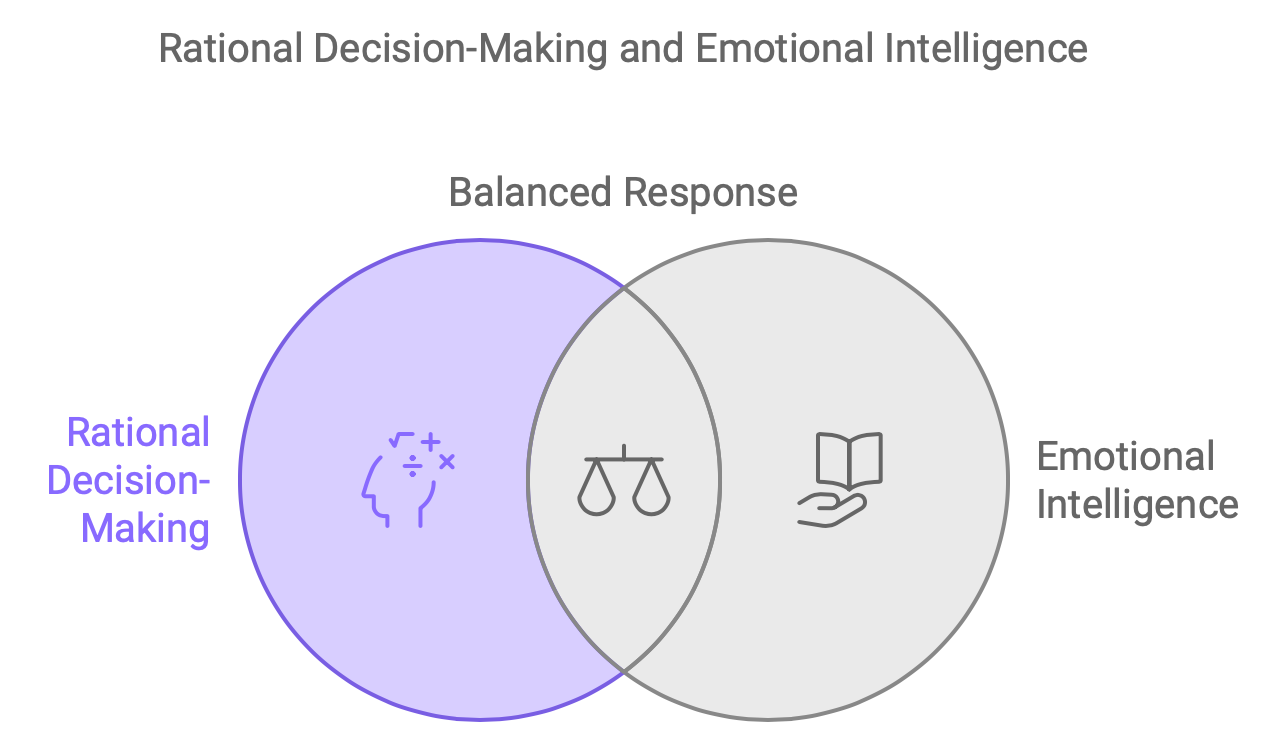
Assertiveness Pros
According to the Mayo Clinic, assertiveness helps you become more confident — you better understand who you are and what you bring. You will be able to control stress and express your feelings clearly when discussing problems with other people. Daniel Ames, professor of management at Columbia Business School, believes that if a manager has a too passive communication style, he will not achieve his goal, if he is too aggressive, he will not be able to get along with others.
Assertive workers are able to realize the value of their opponent’s position, so they quickly find a common language withhim. Such people feel empowered to do their best to find the best solution to the problems they face. They are less anxious, more confident and don’t panic when things go wrong. Read: Why we get angry and how to learn to control ourselves
Assertive workers are able to realize the value of their opponent’s position, so they quickly find a common language withhim. Such people feel empowered to do their best to find the best solution to the problems they face. They are less anxious, more confident and don’t panic when things go wrong. Read: Why we get angry and how to learn to control ourselves
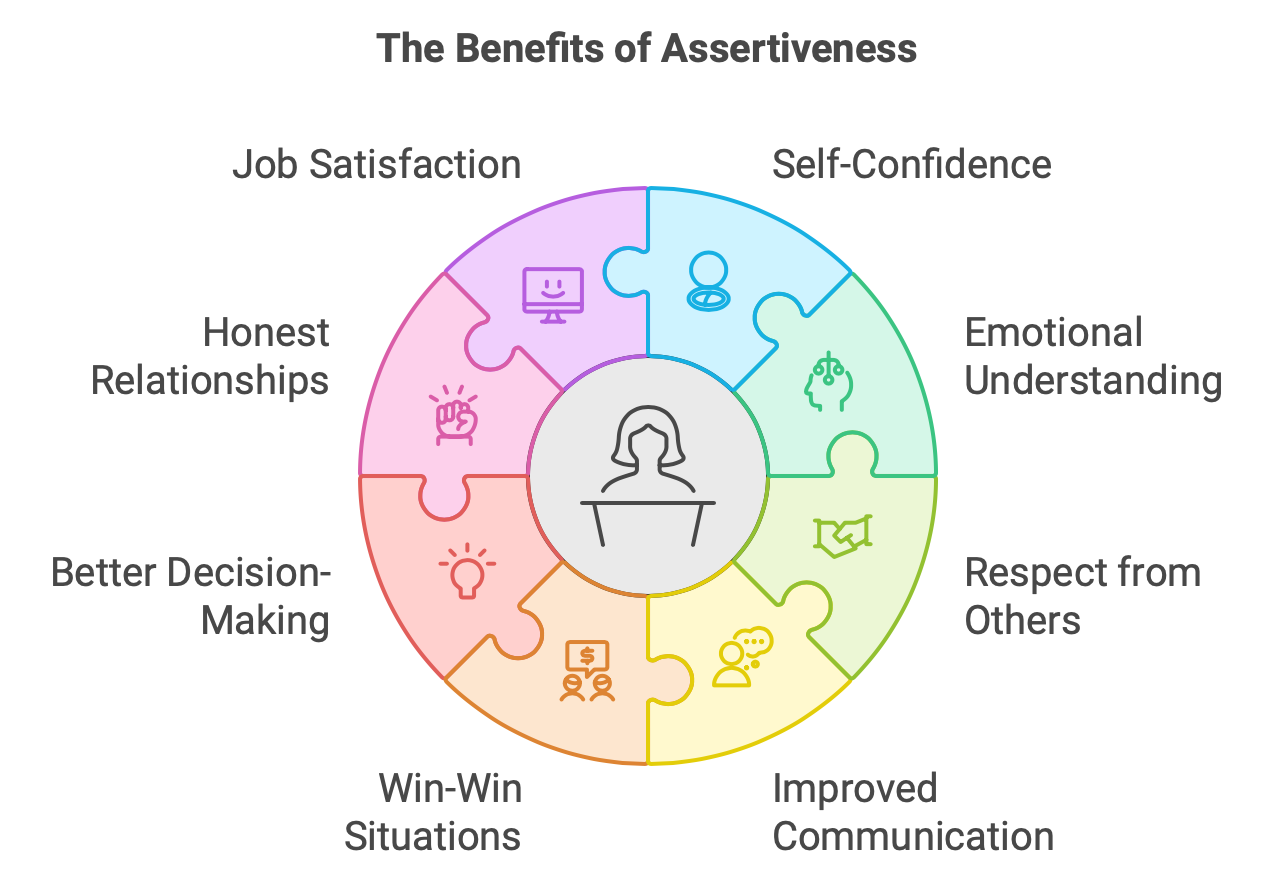
In principle, assertive behavior will help
- gain a self-confidence and self-esteem;
- understand and recognize your feelings;
- earn the respect of others;
- improve communication;
- create win-win situations;
- make better decisions;
- create honest relationships;
- get more job satisfaction.
Assertiveness Cons
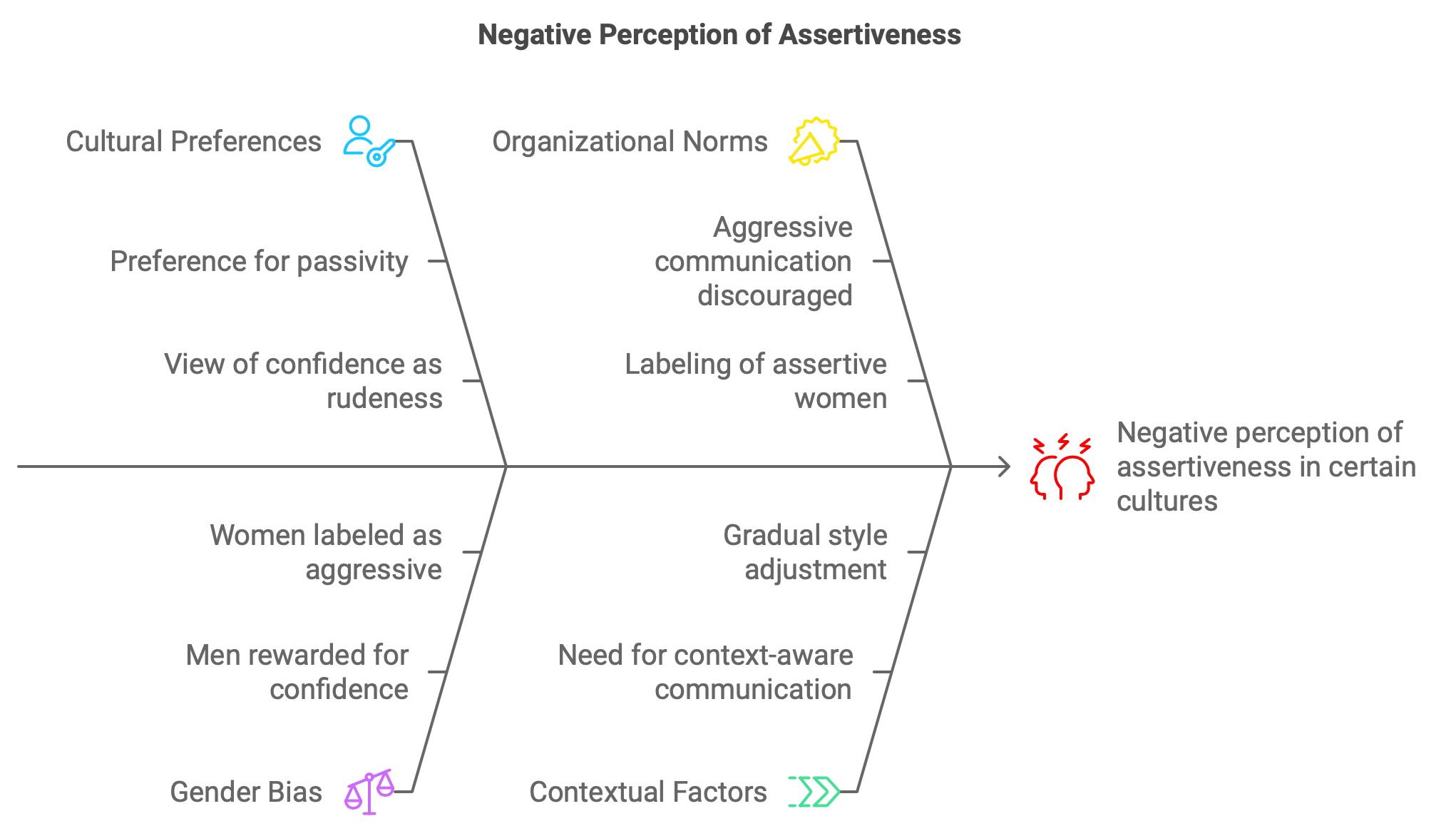
Assertiveness is not always considered a positive trait. In some national and organizational cultures, more passive people are preferred, and confidence is viewed as rude or offensive behavior. At the same time, the reaction to assertive behavior depends on your gender. Researchers believe that men are more likely to receive rewards for confidence than women. Aviva Wittenberg-Cox, CEO of one of the world’s leading gender consulting firms 20-first, warns that women who often talk about what they want are called "bitchy and aggressive."
Before changing behavior, think about the context in which you work and live. This does not mean that you should adapt to the environment — just take your time. Change your communication style gradually until you find what works in your context.
Before changing behavior, think about the context in which you work and live. This does not mean that you should adapt to the environment — just take your time. Change your communication style gradually until you find what works in your context.
How to develop assertiveness
Try to ask yourself the question more often: "What am I doing now and do I want to do it?" For example, everyone buys crypto currency — and you are for the company? Or do you really believe that this is a worthy investment? In the queue atthe clinic, a squabble begins — will you join this conversation? Will you start defending, attacking, resenting along witheveryone else?
Like other soft skills, assertiveness needs to be developed. I suggest auditing your day, analysing communications and looking forward to the future.
Like other soft skills, assertiveness needs to be developed. I suggest auditing your day, analysing communications and looking forward to the future.
Auditing your day
Throughout the day, write down everything you do, including any activities that you spend more than 15 minutes on. In the evening, re-read the resulting plan and give yourself an answer for each item:
I wanted to do it? He came to the kitchen, began to chew cookies for breakfast, but he wanted an omelette and orange juice. Did I notice myself doing this? I wanted to check my work email and did not notice how I was arguing with someone on social networks for half an hour. Did I say exactly what I think? Actually, I don’t really like this book, but for some reason I praised it along with everyone. Did I do what I think is right? He shouted, offended someone — he just did not stop in time.
Repeat the exercise for two weeks: by the end of the second week, meaningful, assertive examples of your behavior will become noticeably more.
I wanted to do it? He came to the kitchen, began to chew cookies for breakfast, but he wanted an omelette and orange juice. Did I notice myself doing this? I wanted to check my work email and did not notice how I was arguing with someone on social networks for half an hour. Did I say exactly what I think? Actually, I don’t really like this book, but for some reason I praised it along with everyone. Did I do what I think is right? He shouted, offended someone — he just did not stop in time.
Repeat the exercise for two weeks: by the end of the second week, meaningful, assertive examples of your behavior will become noticeably more.
Assertiveness in Talent Acquisition and Team Management
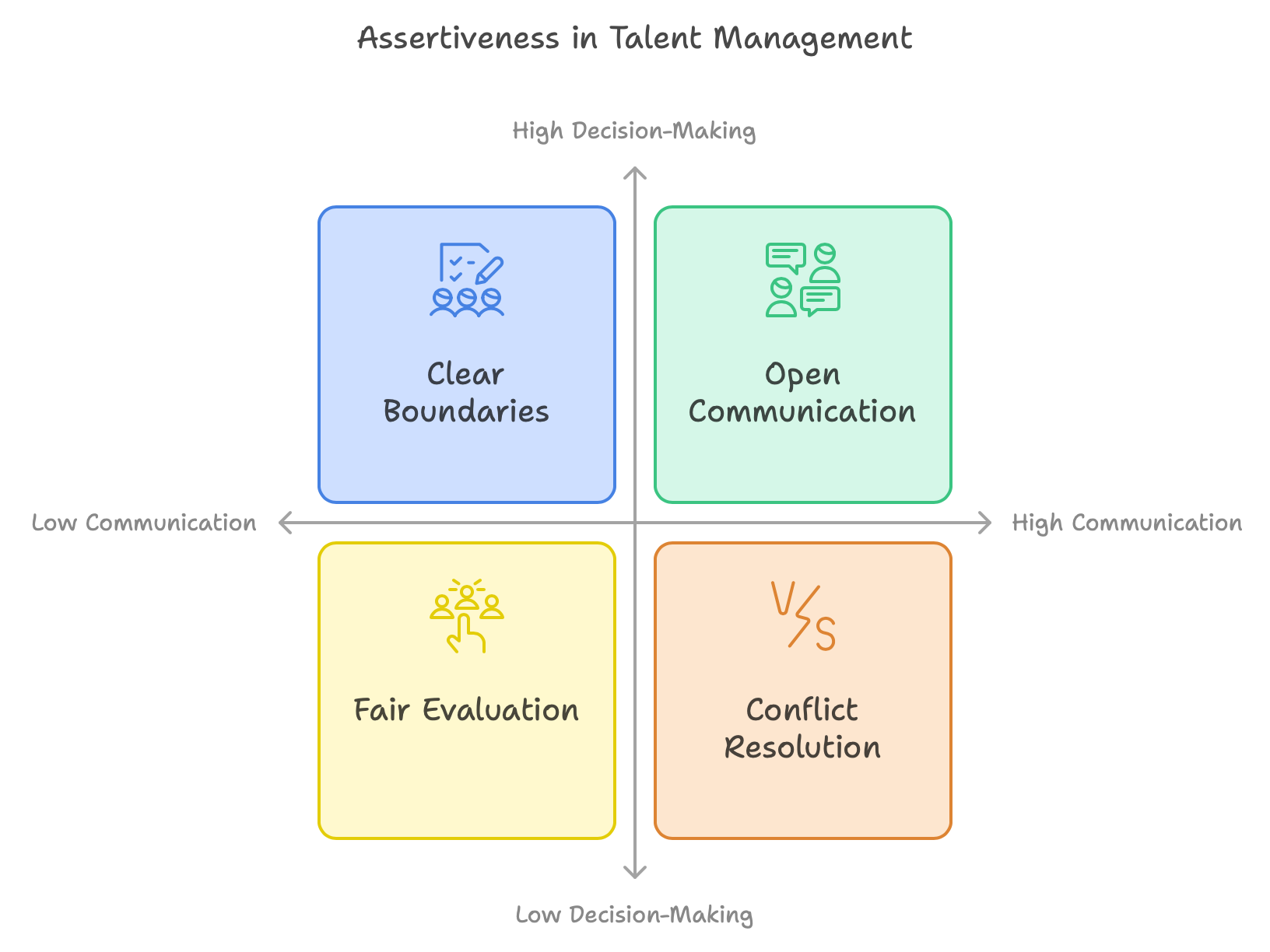
Assertiveness plays a key role in talent acquisition and people management, helping leaders communicate clearly, set boundaries, and make decisions with confidence. In recruitment, assertive professionals ensure that candidates are evaluated fairly, based on clear expectations and mutual respect.
When managing teams, assertiveness fosters open communication and trust, allowing managers to address issues without causing conflict. At UnitiQ, our Fractional HR Services focus on cultivating these skills in managers and employees alike, helping businesses create a more balanced, respectful, and productive work environment. We empower teams to make confident decisions and build strong relationships.
Do you need to hire the right people and foster a strategy that would suit your specific team? Do not be afraid to ask any questions and book a call!
Author: Olga Fedoseeva
I also recommend you to read:
Building High-Performance Teams: Mastering A-Player Talent Acquisition and People Management
No Money, No Problem: 10 Ways to Motivate Your Team
Unique business psychology with TED Talks
Some insights on Transformation to cross-functional teams
Empowering Employees Through Learning: How Skill Development Drives Loyalty and Retention
When managing teams, assertiveness fosters open communication and trust, allowing managers to address issues without causing conflict. At UnitiQ, our Fractional HR Services focus on cultivating these skills in managers and employees alike, helping businesses create a more balanced, respectful, and productive work environment. We empower teams to make confident decisions and build strong relationships.
Do you need to hire the right people and foster a strategy that would suit your specific team? Do not be afraid to ask any questions and book a call!
Author: Olga Fedoseeva
I also recommend you to read:
Building High-Performance Teams: Mastering A-Player Talent Acquisition and People Management
No Money, No Problem: 10 Ways to Motivate Your Team
Unique business psychology with TED Talks
Some insights on Transformation to cross-functional teams
Empowering Employees Through Learning: How Skill Development Drives Loyalty and Retention








